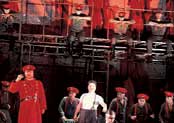OPERA SEARCH

Lady Macbeth of Mtsensk
(1932)Libretto by Alexander Preis and Dmitri Shostakovich after the short story by Nikolai Leskov (R)
3S,A,9T,2Bar,highB,8B-chorus; 2.picc.2.corA.2.Ebcl.bcl.2.dbn-4.3.3.1-timp.perc:tgl/flex/wdbl,/tamb/SD/BD/cyms/tam-t/glsp/xyl-2hp-cel-org (ad lib.)-strings; additional brass:8crt.4tpt.12hn(4A.4T.4Bar).4tuba
Abbreviations (PDF)
VAAP
Maly Opera Theatre, Leningrad
Nikolai Smolich and Vladimir Dmitriev, dir
Conductor: Samuil Samosud
Company: Small Opera Theatre of the State Academy
| BORIS TIMOFEJEWITSCH ISMAILOW, Kaufmann | Hoher Baß |
| SINOWI BORISSOWITSCH ISMAILOW, sein Sohn, Kaufmann | Tenor |
| KATERINA LWOWNA ISMAILOWA, Sinowi Borissowitschs Frau | Sopran |
| SERGEJ, Angestellter der Ismailows | Tenor |
| Ein Betrunkener | Tenor |
| AKSINIA | Sopran |
| Mühlenarbeiter | Bariton |
| Haushofmeister | Baß |
| Zwei Arbeiter | Tenöre |
| Kutscher | Tenor |
| Nihilist | Tenor |
| Priester | Baß |
| Polizeimeister | Bariton |
| Polizist | Baß |
| Betrunkener Gast | Tenor |
| Feldwebel | Baß |
| Wachtposten | Baß |
| SONETKA, eine Gefangene | Alt |
| Alter Gefangener | Baß |
| Gefangene | Sopran |
| Arbeiter, Vorarbeiter, Polizisten, Gäste, Sträflinge |
Kursk Gubernia, Rußland, Mitte des 19. Jahrhunderts
Katerina langweilt sich in ihrem Leben mit Sinowi Ismailow, einem reichen Provinzkaufmann. Als Sinowi einmal auf Geschäftsreise ist, läßt ihr mißtrauischer Vater Boris sie Treue zu seinem Sohn schwören.
Die Arbeiter im Werk belästigen die dicke Köchin Aksinia und wollen den Vorarbeiter Sergej überreden, sie zum Spaß der ganzen Truppe zu vergewaltigen. Katerina kommt herbei, um Aksinia zu helfen, worauf Sergej ihre Hand mit dem Ehering nimmt und so quetscht, daß es schmerzt. Katerina fühlt sich angesichts Sergejs Stärke schwach werden. In der darauffolgenden Nacht kommt Sergej in Katerinas Schlafzimmer und verführt sie. Boris beschließt, die Abwesenheit seines Sohnes zu nutzen und selber mit seiner Schwiegertochter zu schlafen. Er tobt, als er Sergej aus Katerinas Zimmer kommen sieht. Er peitscht den Vorarbeiter erbarmungslos aus und verlangt anschließend von Katerina, ihm etwas zu Essen zu bringen. Aus Rache bringt sie ihm vergiftete Pilze. Er stirbt einen qualvollen Tod. Als sie in ihrem Schlafzimmer mit Sergej schläft, erscheint ihr der Geist Boris, der sie verflucht, doch sie bleibt unerschrocken. Da kehrt Sinowi zurück. Mit Sergejs Hilfe erwürgt sie ihn und versteckt die Leiche im Keller. Sie geht regelmäßig dorthin, um nach der Leiche zu schauen, was die Aufmerksamkeit eines betrunkenen Bauern erregt. Er sieht nach in der Hoffnung, versteckte Wodkaflaschen zu finden. Als er stattdessen Sinowis Leiche entdeckt, rennt er zur Polizei. Die Polizisten sind ohnehin gelangweilt und unzufrieden, da sie nicht zur Katerinas und Sergejs Hochzeit eingeladen wurden und frohlocken über die Nachricht. Sie eilen zur Hochzeitsfeier. Katerina gesteht alles, und sie und Sergej werden verhaftet.
Eine Gruppe Häftlinge, unter ihnen Katerina und Sergej, ist nach Sibirien unterwegs und macht des Nachts an einem See Halt. Sergej hat mittlerweile genug von Katerina und schäkert mit der schönen jungen Sonetka herum. Als Katerina ihn zurück zu sich holen will, bittet er sie um ihre Socken, da er friere. Sie gibt sie ihm, doch er gibt sie Sonetka und die beiden spotten über Katerina. Wütend und verzweifelt zieht Katerina Sonetka mit sich in den See, und beide ertrinken.
One of the masterpieces of Shostakovich’s early years, and one of the great operas of the 20th century, ‘Lady Macbeth’ is a masterly and thrilling musical version of a terrifying tale by the 19th century writer Nikolai Leskov. From the very beginning of its existence this opera has provoked passionate admiration and almost equally passionate condemnation.
The story tells of a young woman of the deep provinces, Katerina Izmailova, who, lonely and bored with her marriage and her life, takes a lover, the foreman Sergei. With the connivance of Sergei, she murders first her rich father-in-law and then her husband, thereby becoming owner of the rich mill that had belonged to them. But her crime is discovered and she and Sergei are condemned to exile in Siberia. When Sergei takes another convict, Sonia, as his new mistress, the betrayed Katerina hurls Sonia and herself into a deep river where they both drown.
To write the music of what is, to all intents and purposes, a melodramatic thriller, Shostakovich returned to the language of 19th century Russian composers and to the example of Verdi. The result is one of the most vocal operas of its time, in which the drama is unfolded through brilliant arches of solo and choral sound, interspersed with brutal or melancholy orchestral interludes and outbursts. The effect is to lift a pessimistic tale of ignorance, coarseness and violence to the level of high tragedy.
Early productions of ‘Lady Macbeth’ from 1934 onwards were so successful that the opera was quickly taken up internationally. In January 1936 Stalin and his henchmen visited a production of the opera in Moscow and, a few days later, a virulent and scurrilous official campaign was launched against the composer, beginning with a world-notorious article headed ‘Muddle instead of Music’ which branded him as decadent, pornographic, bourgeois, pro-western, and, in sum, anti-Soviet. This turned out to be the signal for the start of one of Stalin’s most vengeful and repressive campaigns against the Soviet intelligentsia as a whole. Shostakovich’s career was, at least temporarily, in ruins. The opera was hardly to be revived again until the 1960s, when it appeared in a revised and toned-down version (see op.114). Since the rediscovery of the original version in the 1980s, this opera has hardly been absent from the international operatic scene. It may now be considered standard repertory.
Note by Gerard McBurney
dramatisch
Galina Vishnevskaya, Nicolai Gedda, Dimiter Petkov, Werner Krenn, Robert Tear, Taru Valjakka, Martyn Hill, Leonard Andrzej Mróz, Aage Haugland, Birgit Finnilä, Alexander Malta, Leslie Fyson, Steven Emmerson, John Noble, Colin Appleton, Alan Byers, James Lewington, Oliver Broome, Edgar Fleet, David Beavan, Linda Richardson, Ambrosian Opera Chorus, London Philharmonic Orchestra, Mstislav Rostropovich
EMI CDM 567 776-2 (2CDs)
